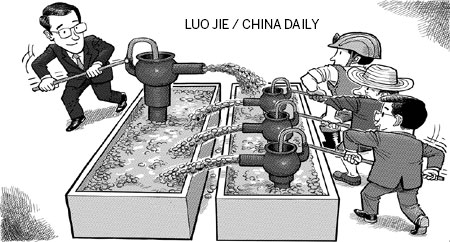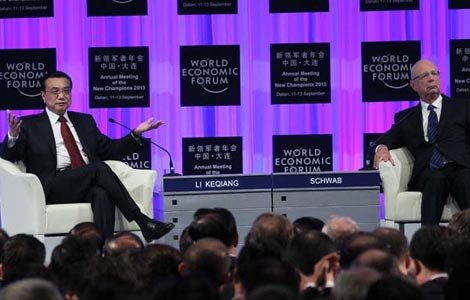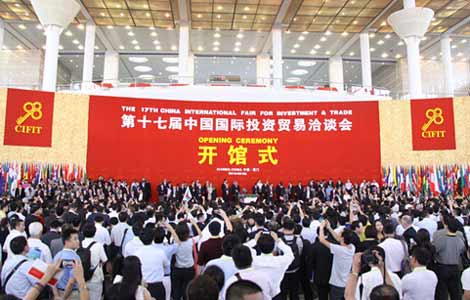More equal tax system needed
Updated: 2013-09-12 07:34
By Colin Speakman (China Daily)
|
||||||||
The Chinese dream of rejuvenating and re-energizing the Chinese nation, which President Xi Jinping has positioned as a rallying cry for the further development of a harmonious China, needs to be accessible to most, if not all, Chinese citizens.
At the 18th National Congress of the Communist Party of China, Chinese leaders firmly set a goal to double the country's GDP, and per capita income of urban and rural residents by 2020 to establish a moderately prosperous society in all respects. But given the well-documented income gap between rural and urban areas, the absolute difference in incomes would surely widen in this process. It is hard to eliminate this relative poverty, though it must be conceded that living costs are lower in rural areas.
Nevertheless, a positive step toward income redistribution is needed to lessen the urban-rural divide as urbanization gains pace.
What seems likely is that continued urbanization will create a growing middle class, which may reach 600 million by the end of this decade. The current application of the personal income tax system, with a monthly threshold of 3,500 yuan ($571.85) before income becomes liable to tax, means that more than 80 percent of Chinese citizens do not pay income tax.
This threshold will surely be raised in the future and the average rural resident may still pay no income tax even in 2020. In first-tier cities, many would argue that living on 5,000 yuan to 7,000 yuan a month is very challenging and would like a higher threshold even today. Yet as China's middle class grows, it is unrealistic for such a large group of the population not to contribute in a meaningful way to income-tax revenue.
There are significant differences in per capita GDP in different regions of China. Data from the National Bureau of Statistics show that in 2011, per capita GDP of Beijing, Guangzhou and Shanghai, Jiangsu, Jilin and Zhejiang provinces, and the Inner Mongolia autonomous region was more than 50,000 yuan a year, whereas that of Gansu, Guizhou and Yunnan provinces, and the Tibet autonomous region was less than half of that. Yet as in most countries, income tax is a national system that does not take into account these differences.
Direct taxation of income is a key method of redistributing income where there is significant inequality in the distribution of income pre-tax. Among the major economies, China is one of the most unequal societies in terms of income distribution. The extent of income inequality is measured by Gini index, named after Italian statistician Corrado Gini. The closer this index is to zero, the more equal is the distribution, with anything exceeding 0.4 considered worrying.
In the days after the founding of New China, the country's Gini index stood around 0.1 (a largely equal society). But in 2012 it stood at 0.474 - a worryingly high level of inequality. No wonder, a goal of the 12th Five-Year Plan (2011-2015) is to reduce income inequality among people - a key to social harmony.
China's reform and opening-up was based on letting some areas and groups "get rich first", but now the rest must be helped to catch up. Recent policies on directing and encouraging investment into the country's western region reflect this.
The revenue from indirect taxation on goods and services is very important for China but it does not help redistribute income. In fact, it does the opposite, because it typically represents a higher proportion of a low-income person's expenditure - a regressive structure, which benefits high-income earners who can afford to save more of their income. The authorities are already looking at measures to raise the direct tax on profits of State-owned enterprises and property taxes on the rich.
These are important symbols of intent, but if income inequality is to be reduced post-tax, there is no option for China but to reform its income-tax system into a more progressive structure which has an impact on a wider section of society - the middle class and particularly the rich. Such policies could be accompanied by a reduction in some expenditure taxes, including the rate of tax on luxury goods. This could help one of China's other major economic goals of raising domestic consumption.
The Chinese dream needs to be based on an inclusive society in which there is a sense of fairness. This does not mean exceptional efforts and enterprises should not receive extra rewards, but the government has to ensure that the well-off and rich section of society contributes more to welfare funds for the less well off, and that none gets rich through corruption and evasion.
The author is an economist and Director of China Programs for CAPA International Education, a US-UK based organization that cooperates with Capital Normal University and Shanghai International Studies University.

(China Daily USA 09/12/2013 page12)

 Premier stresses transformation of the economy
Premier stresses transformation of the economy
 Soyuz capsule returns from space station
Soyuz capsule returns from space station
 China's Christian churches reduce leaders' age ceiling
China's Christian churches reduce leaders' age ceiling
 Student's rare blood bonds Kazakhstan and China
Student's rare blood bonds Kazakhstan and China
 Apple's low-end phone price disappointing
Apple's low-end phone price disappointing
 US marks 9/11 anniversary
US marks 9/11 anniversary
 German Bach elected as IOC president
German Bach elected as IOC president
 Implant surgery for boy's eyes a success
Implant surgery for boy's eyes a success
Most Viewed
Editor's Picks

|

|

|

|

|

|
Today's Top News
China Daily Asia Weekly wins media award
Report questions US firms pursuing cloud computing in China
Reducing poverty gains momentum in Asia
China turns to US sorghum for animal feed
China's global firms face 'trust gap'
Li stresses transformation of economy
US delivers weapons to Syrian rebels
FM dismisses Philippine accusations
US Weekly

|

|






